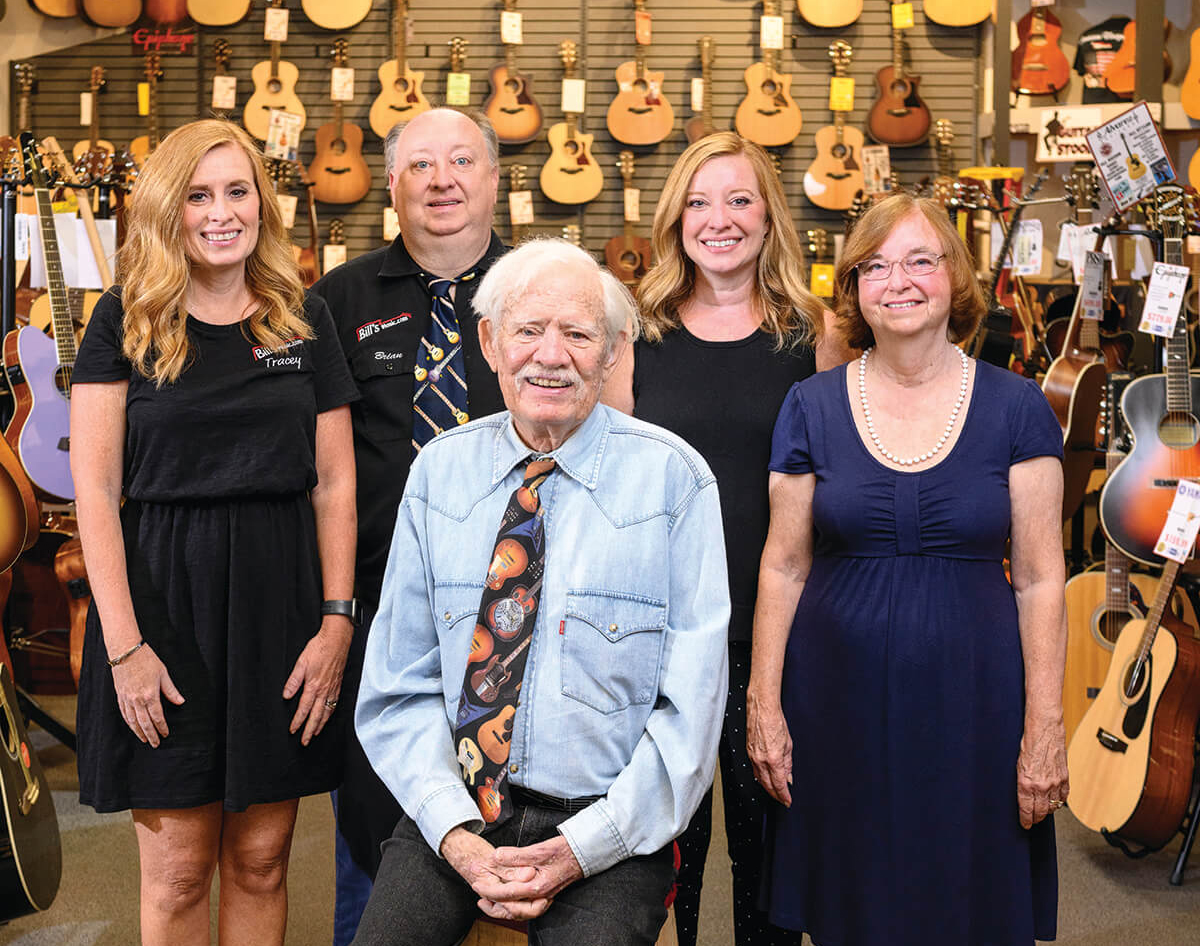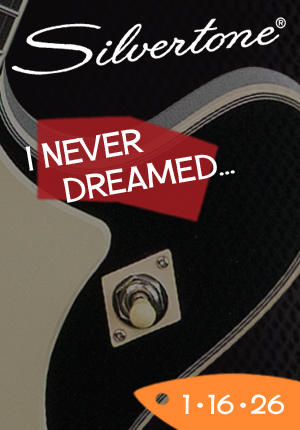
Thomann CEO Hans Thomann Jr.
Given that Burgebrach, Bavaria, Germany-located Thomann is, today, an MI retailer with 1,600 employees occupying a one-million-square-feet campus serving a database of 13 million customers, it’s remarkable when you consider where the company began — on the back of a motorbike.
Thomann CEO Hans Thomann Jr. relayed the story of how and why his father, Hans Thomann Sr., started the company in 1954. “He was born into a family of farmers, and had things gone his parents’ way, he would have taken over the family farm one day,” Thomann said. “But from his childhood he had a love for and fascination with music, [so] he didn’t follow that path.”
Thomann Sr. learned to play trumpet, excelling on the instrument to where he began attending a regional conservatory, paying for his own instruments and tuition. He supported himself by playing festivals and even joining the circus as a musician. Thomann Sr. soon noticed he and his musician friends had no music shop nearby, so he started selling instruments himself from the back of his motorbike, which was advantageous because he could travel around to find bands to convert them to customers.
Eventually he turned part of his newly built family home into a music store, and the MI giant Thomann has become grew right around that same building.
Thomann’s grassroots beginnings had laid a solid foundation for a business intertwined with its community. “Thanks to his wide network of contacts in the regional music scene, my dad immediately had a solid and loyal customer base,” Thomann said. “The shop was always more than just a place to buy instruments and equipment, it was also a place to get together and talk shop.” The basement even boasted a bar.
In 1968, the family home was extended into a wing built to be used as a store. “I did my first work there when I was definitely underage,” he said.
Initially, Thomann Jr. focused on wind instruments, but soon branched out. “I came into my own when, in the ’70s, home organs became a thing, and I trusted they would be more than just a fad,” he said “Luckily, in those years there was a very active music scene in our part of Germany.” Some local bands scored top 40 hits in Germany. “Those were not the traditional oom-pah bands my father served.”
These bands — with names like Big Ben, Crazy Family, Ground Control, Ice Cream, Joker, Lollipop, Marionets and Sound City — wanted new kinds of equipment, like PA systems and synthesizers. “I really got into synthesizers, traveling to manufacturers in Japan and the U.S. in the 1980s, where I acquired the expertise that made me the go-to guy for this entire class of instruments in the region and beyond,” he said. “This made Thomann a known and trusted name nationwide.”
Hot Deals
It’s here that Thomann started branching out in ways that would eventually make it the online powerhouse it is today. First it got into the mail-order business. “We came up with regular flyers called ‘Hot Deals’ that we would send to all customers in our database,” Thomann Jr. said. “So, even before we went online, we were already selling nationwide. Going online was the logical next step, and we were fortunate enough to have Sven Schoderbock in our company, who very early on realized the potential of the internet.”
According to Schoderbock, who is now Thomann’s vice president of e-commerce, what’s become the Thomann Cyberstore was initially just a small website, started in 1996, that informed people about the brick-and-mortar shop. “We also offered direct e-mail contact, which was considered very innovative among our customers even though we just had one CompuServe e-mail account and had to print out the customer requests, bring the paper to the specialists in our departments, collect their answers later and reply to the customers, who loved the service even though it sometimes took a week for us to reply,” Schoderbock said with a laugh.
But this grew. In 1997, Thomann opened its first online shop. In 1999, it went international with subsections for other European countries. In 2006, it launched a whole new site. “That was light years better than our old website and most competitors’ [sites],” Schoderbock said. “This also led to the biggest growth rates in our company history and a rapid international expansion.”
From there, it branched out to an app and a mobile friendly site. Forty percent of Thomann’s sales come from mobile devices.
Thomann’s site continually evolves. “We’ve rewritten many parts of the [site] multiple times to satisfy customer demand and [make it] more data driven and personalized,” Schoderbock said. Today, Thomann employs 15 developers and project managers to run the site and another 100 to add content constantly.
A Musical Family
Despite having reached out so widely, Thomann keeps some things very close to home — remaining family owned for over six decades. To Thomann Jr., the advantage of this is it makes everything personal. “All my siblings and some of my nieces and nephews work in the company to this day,” he said. “I believe that running a family business leads to a different feeling of responsibility for the well-being of the company and also its employees. You may be more interested in long-term, sustainable development rather than having to demonstrate your ability to turn a profit in the short term, which is what happens when you rely on outside investors or shareholders.” For this reason, Thomann has never even considered going public.
Thomann also keeps another fundamental close — music itself. “My father made sure all of us learned to play at least one instrument,” he said. “We’d play for the family at Christmas time when we were children, and we still play for each other on birthdays and other occasions. Being a musical family made us appreciate the fact that our company should also be a place where our extended staff should be likewise musically minded.”
This respect for the history of the company shows in how its campus has grown around the family home. And that campus is set to more than double its floor space to 120,000 square feet as the company has planned a major expansion. Thomann Jr. explained why. “The driver of this is actually the changed expectation of immediate choice that customers have nowadays thanks to internet shopping. They see all the products in our web store and expect a similar breadth of instruments to be displayed in the shop. Now, we have for a long time made sure that our customers can try out each and every instrument they want to, but this involves either waiting or booking such instruments in advance. Extending the floor space will allow us to make more instruments available without customers having to wait.”
The Right Thing To Do
Like any business today, Thomann is finding itself challenged by COVID-19. Its store was entirely shut down in mid-March for two months on orders of the state government, and when it opened, like any store, it had to establish new protocols. Today, Thomann customers pick up a badge upon entering the store that they have to return when they leave, and must specify what departments they’re going to visit. Trying out an instrument is by appointment only and wind instruments are sampled in single-occupant rooms.
As was seen in MI across the board in 2020, Thomann’s online sales were strong in a familiar pattern, instruments and home-production equipment performed well and stage and event tech sold less.
“Audio Professionell [a unit of Thomann dedicated to installing sound systems] has been affected very badly, of course,” Thomann said. “Pretty much all performance venues have been shut down since March, and while musicians and ensembles have [strived], especially over the summer, to perform for audiences while maintaining coronavirus safety protocols, these performances are only a fraction of what usually goes on.”
Employee health is a concern for Thomann, of course, and Thomann Jr. indicated this does make staffing difficult. Speaking to Music Inc. at the end of October, he described the resurgence of COVID-19.
“We are now fully in the second wave, and the difference from the first wave is that there are no clearly definable hot spots,” he said. “The virus is coming back with a vengeance all over Germany. The government-introduced coronavirus protocols mean that anyone having been in contact with a diagnosed person must immediately self-isolate until tested negative after a specified incubation period, which has led to problems with staff planning in some departments.” He quickly added, “This is not a complaint against the measures.”
Four Tips
As his company has been in business for 66 years, Thomann Jr. has a few tips for fellow MI retailers. First off: sell what you know and know what you sell. “The only way we as music retailers can persevere against generalist online retailers is that we know more about the instruments and equipment,” he said.
The second tip is to make sure everything you send out is as the customer expects. “We have 70 staff [members] in our quality control department who check every single hand-crafted instrument, perform spot checks on all industrially produced instruments and devices, and set up the wind and string instruments according to customer order,” he said.
The third tip? Sell what you love yourself. “So many of our staff are musicians themselves,” he said. “This is important not just because it bonds us within the company, it also makes us credible to our customers.”
Schoderbock offered a fourth tip that seems unexpected given the accelerating move toward online sales in 2020. If you’re not into selling online, you don’t have to.
“Serious e-commerce can nowadays only be handled by smart people with a passion for future technology, a digital mindset and a lot of curiosity,” he said. “If that doesn’t count for you, don’t do e-commerce! Instead, you can try to leverage social media to interact with customers and shape your brand.”
That’s how Thomann approaches social media. Schoderbock said less than 10 percent of its activities on social media are sales driven.
Set Up For Meager Times, Too
As for where Thomann’s headed in the future, it’s not America. “We do have U.S. customers, but we do not intend to take any steps [or] measures addressing the U.S. market specifically,” Thomann Jr. said.
Regardless, he’s cautiously optimistic going forward. “It does greatly depend on how we weather the next few months,” he said. “Being a family company, we have had the luxury and foresight to set ourselves up for meager times, too, and this is proving to be very helpful at the moment. As long as people don’t give up on music, there’ll be a way for us to fit them out with what they need. And the last months have shown that music is too important for people to give up on.” MI











